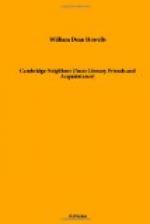Of as gentle make but of more pensive temper, with unexpected bursts of lyrical gaiety, was Christopher Pearse Cranch, the poet, whom I had known in New York long before he came to live in Cambridge. He could not only play and sing most amusing songs, but he wrote very good poems and painted pictures perhaps not so good. I always liked his Venetian pictures, for their poetic, unsentimentalized veracity, and I printed as well as liked many of his poems. During the time that I knew him more than his due share of troubles and sorrows accumulated themselves on his fine head, which the years had whitened, and gave a droop to the beautiful, white-bearded face. But he had the artist soul and the poet heart, and no doubt he could take refuge in these from the cares that shadowed his visage. My acquaintance with him in Cambridge renewed itself upon the very terms of its beginning in New York. We met at Longfellow’s table, where he lifted up his voice in the Yankee folk-song, “On Springfield Mountain there did dwell,” which he gave with a perfectly killing mock-gravity.
XI.
At Cambridge the best society was better, it seems to me, than even that of the neighboring capital. It would be rather hard to prove this, and I must ask the reader to take my word for it, if he wishes to believe it. The great interests in that pleasant world, which I think does not present itself to my memory in a false iridiscence, were the intellectual interests, and all other interests were lost in these to such as did not seek them too insistently.
People held themselves high; they held themselves personally aloof from people not duly assayed; their civilization was still Puritan though their belief had long ceased to be so. They had weights and measure, stamped in an earlier time, a time surer of itself than ours, by which they rated the merit of all comers, and rejected such as did not bear the test. These standards were their own, and they were satisfied with them; most Americans have no standards of their own, but these are not satisfied even with other people’s, and so our society is in a state of tolerant and tremulous misgiving.




